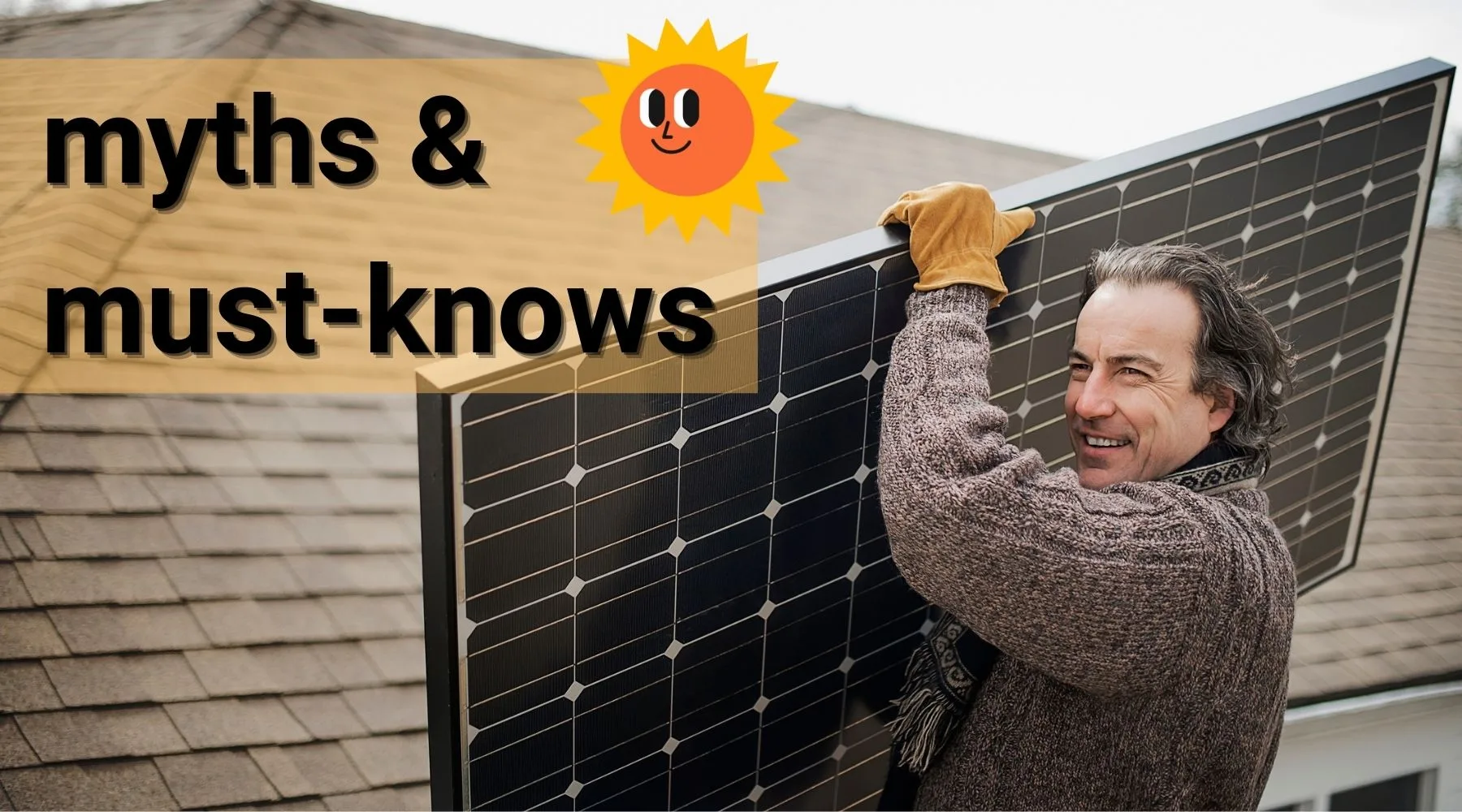Home solar systems: 5 myths and must-knows

Home solar has come a long way in recent years. You might be surprised by just how much has changed.
 Sponsored by Brighte. Get solar sooner with Brighte's 0% interest finance and network of over 2,000 trusted tradies. Borrow up to $30,000 and repay it with fortnightly instalments.T&Cs apply.*
Sponsored by Brighte. Get solar sooner with Brighte's 0% interest finance and network of over 2,000 trusted tradies. Borrow up to $30,000 and repay it with fortnightly instalments.T&Cs apply.*
Sponsored by Brighte. Get solar sooner with Brighte's 0% interest finance and network of over 2,000 trusted tradies. Borrow up to $30,000 and repay it with fortnightly instalments. T&Cs apply.*
Data from the Clean Energy Regulator shows that a very modest 118 rooftop solar panel systems were installed across Australia in 2011.
Fast forward to 2021 and, despite having to navigate intermittent lockdowns, that number skyrocketed to an incredible 370,000.
Clearly, a lot has changed in 20 years. Australian homeowners are adopting solar in droves and there are now well over 3 million rooftop solar systems installed across the country.
Yet, despite the popularity, some uncertainty around solar remains. If you're among the Aussie homeowners yet to embrace solar, this article is for you.
We've partnered with Brighte to bust some common solar myths and bring you some important must-knows. That way, you have the information you need to make a fully informed decision.
Myth: It's expensive
Yes, installing a rooftop solar panel system is probably going to cost a few thousand dollars. But it may pay for itself in time.
Data from Brighte shows that the average residential solar customer saves over $1,000 a year on electricity1. According to the Australian Energy Foundation (AEF), most solar systems will pay for themselves within 3-5 years.
If the up-front cost is a concern, there are ways to make that more manageable too.
There are several state-based and national schemes that can help towards the cost of installation. In Victoria, homeowners can receive up to $1,400 per solar panel system.
Nationally, the Small-scale Renewable Energy Scheme provides rebates for a variety of systems, including solar panels, solar water heaters and heat pumps.
Affordable finance is also available. For example, Brighte offers 0% interest payment plans for solar systems. Customers can borrow up to $30,000 and instead of charging interest, Brighte charges a flat $2.15 weekly account-keeping fee*. That's $111.80 a year no matter how large your loan ends up being.
Must-know: They could add value to your home
Although there's been relatively little research in Australia, a handful of US-based studies suggest that residential solar panels can increase the value of a home.
The US National Bureau of Economic Research found that solar panels attracted a 3.5% increase in value. That's $35,000 on a million-dollar home.
California-based Berkeley Lab analysed almost 22,000 home sales and found that buyers paid an extra US$15,000 (AUD$19,420) on average for a property with solar power.
On home ground, an Origin Energy survey found that 77% of Australians valued a property higher if it was installed with solar panels2.
Myth: They're difficult to install
Once upon a time, finding an accredited solar panel installer within a 100km radius might have been a bit of an arduous mission. But as the popularity of solar has increased, so too has the number of skilled tradies who are fully qualified and capable of installing them.
Solar finance provider Brighte currently works with a network of over 2,000 accredited installers that can help with a customer's installation.
You can even request free no-obligation quotes from Brighte's network of tradies so you can see whether solar panels are within your budget, how they'll work with your home and if they're right for you.
Must-know: They work even when it's not sunny
Yes, solar panels will be most efficient when the sun is shining directly on them. But that doesn't mean you should write them off if you live in a colder, cloudier area. Electricity can still be generated when it's grey and cold.
Even rainy days can be beneficial as they can help wash away dirt and dust that may impact the efficiency of your solar panels.
While electricity won't be produced at night, a solar battery storage system can help store the electricity generated during the day for later use.
A storage system can also help homeowners earn money from their excess energy. If they join a virtual power plant (which is basically a network of home solar battery systems working together) they may be able to sell excess energy back into the national grid.
 Sponsored by Brighte. Get solar sooner with Brighte's 0% interest finance and network of over 2,000 trusted tradies. Borrow up to $30,000 and repay it with fortnightly instalments.
Sponsored by Brighte. Get solar sooner with Brighte's 0% interest finance and network of over 2,000 trusted tradies. Borrow up to $30,000 and repay it with fortnightly instalments.
Sponsored by Brighte. Get solar sooner with Brighte's 0% interest finance and network of over 2,000 trusted tradies. Borrow up to $30,000 and repay it with fortnightly instalments.
Compare other finance options here
*T&Cs apply. Fees, terms and conditions and credit approval criteria apply.
- Deloitte Access Economics - Brighte Consumer and Vendor Study 2019
- Origin Good Energy Report – April 2018
